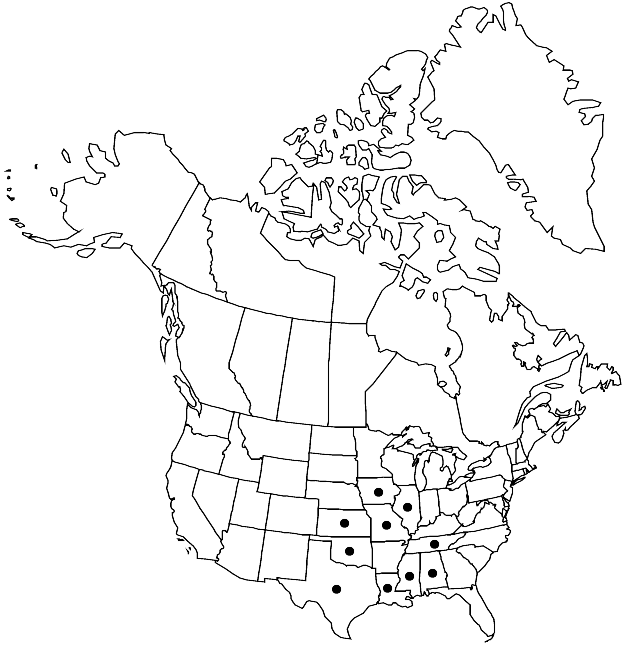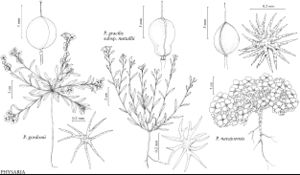Difference between revisions of "Physaria gracilis"
Novon 12: 323. 2002.
FNA>Volume Importer |
FNA>Volume Importer |
||
| Line 11: | Line 11: | ||
|name=Vesicaria gracilis | |name=Vesicaria gracilis | ||
|authority=Hooker | |authority=Hooker | ||
| + | |rank=species | ||
|publication_title=Bot. Mag. | |publication_title=Bot. Mag. | ||
|publication_place=63: plate 3533. 1836 | |publication_place=63: plate 3533. 1836 | ||
| Line 17: | Line 18: | ||
|name=Alyssum gracile | |name=Alyssum gracile | ||
|authority=(Hooker) Kuntze | |authority=(Hooker) Kuntze | ||
| + | |rank=species | ||
}} {{Treatment/ID/Synonym | }} {{Treatment/ID/Synonym | ||
|name=Lesquerella gracilis | |name=Lesquerella gracilis | ||
|authority=(Hooker) S. Watson | |authority=(Hooker) S. Watson | ||
| + | |rank=species | ||
}} | }} | ||
|hierarchy=Brassicaceae;Brassicaceae tribe Physarieae;Physaria;Physaria gracilis | |hierarchy=Brassicaceae;Brassicaceae tribe Physarieae;Physaria;Physaria gracilis | ||
| Line 55: | Line 58: | ||
-->{{#Taxon: | -->{{#Taxon: | ||
name=Physaria gracilis | name=Physaria gracilis | ||
| − | |||
|authority=(Hooker) O’Kane & Al-Shehbaz | |authority=(Hooker) O’Kane & Al-Shehbaz | ||
|rank=species | |rank=species | ||
| Line 67: | Line 69: | ||
|publication year=2002 | |publication year=2002 | ||
|special status= | |special status= | ||
| − | |source xml=https://jpend@bitbucket.org/aafc-mbb/fna-data-curation.git/src/ | + | |source xml=https://jpend@bitbucket.org/aafc-mbb/fna-data-curation.git/src/f50eec43f223ca0e34566be0b046453a0960e173/coarse_grained_fna_xml/V7/V7_1063.xml |
|tribe=Brassicaceae tribe Physarieae | |tribe=Brassicaceae tribe Physarieae | ||
|genus=Physaria | |genus=Physaria | ||
Revision as of 23:12, 16 December 2019
Annuals or biennials; (delicate, wiry); with a fine taproot; pubescent, trichomes (sessile or subsessile), 4–7-rayed, rays distinct, usually furcate, occasionally bifurcate, (smooth to somewhat tuberculate). Stems simple to several from base, erect, often outer decumbent, (unbranched or branched distally), 1–7 dm. Basal leaves: blade oblanceolate to elliptic, 1.5–8(–11.5) cm, margins lyrate-pinnatifid to dentate or repand, (abaxial surface densely pubescent, adaxial sparsely pubescent). Cauline leaves: (proximal petiolate, distal sessile); blade oblanceolate to oblong, 1–7 cm, margins dentate to repand. Racemes loose, (elongated). Fruiting pedicels (usually divaricate-spreading, sometimes horizontal or shallowly recurved, straight or slightly curved), (7–)10–20(–25) mm, (slender or stout). Flowers: sepals elliptic or broadly ovate, 3–6.5(–8) mm, (median pair slightly thickened apically, cucullate); petals (yellow to orange), broadly obovate, 6–11 mm, (narrowing gradually to short claw). Fruits (stipitate or subsessile, gynophore 1–2 mm), globose, subglobose, obpyriform, or obovoid, not or slightly inflated, 3–9 mm; valves (not retaining seeds after dehiscence), glabrous throughout or sparsely pubescent inside; replum as wide as or wider than fruit; ovules 8–20(–28) per ovary; style 2–4.5 mm. Seeds slightly flattened.
Distribution

c, se United States.
Discussion
Subspecies 2 (2 in the flora).
Selected References
None.
Key
| 1 | Stems to 7 dm; cauline leaves: blade margins usually deeply dentate, rarely repand; fruits ± sessile, globose or subglobose, 3-6 mm, bases rounded. | Physaria gracilis subsp. gracilis |
| 1 | Stems usually less than 3 dm; cauline leaves: blade margins frequently repand, occasionally dentate; fruits stipitate (gynophore slender), obpyriform to narrowly obovoid, (5-)6-9 mm, bases truncate. | Physaria gracilis subsp. nuttallii |
